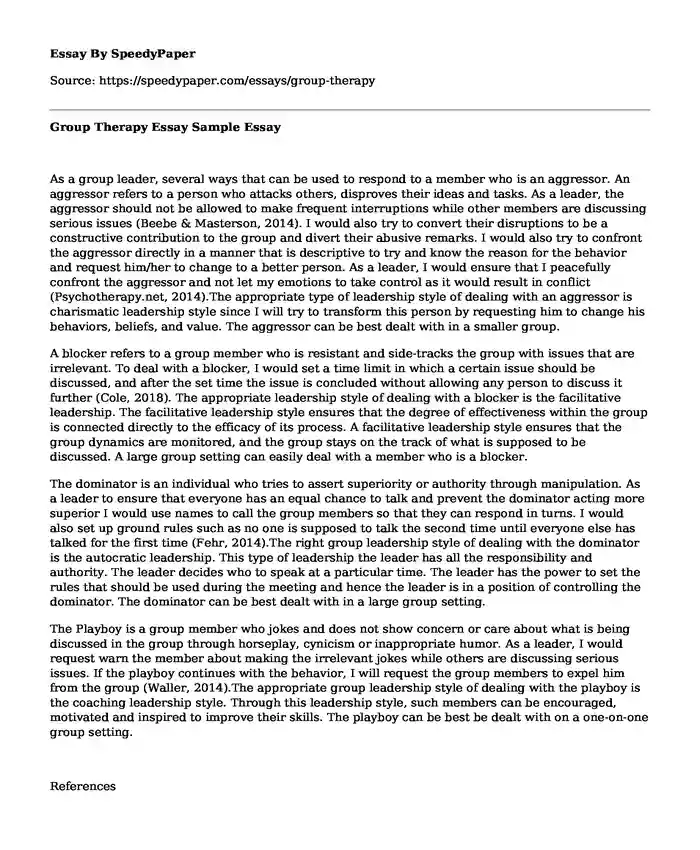
| Type of paper: | Report |
| Categories: | Communication Counseling |
| Pages: | 3 |
| Wordcount: | 668 words |
As a group leader, several ways that can be used to respond to a member who is an aggressor. An aggressor refers to a person who attacks others, disproves their ideas and tasks. As a leader, the aggressor should not be allowed to make frequent interruptions while other members are discussing serious issues (Beebe & Masterson, 2014). I would also try to convert their disruptions to be a constructive contribution to the group and divert their abusive remarks. I would also try to confront the aggressor directly in a manner that is descriptive to try and know the reason for the behavior and request him/her to change to a better person. As a leader, I would ensure that I peacefully confront the aggressor and not let my emotions to take control as it would result in conflict (Psychotherapy.net, 2014).The appropriate type of leadership style of dealing with an aggressor is charismatic leadership style since I will try to transform this person by requesting him to change his behaviors, beliefs, and value. The aggressor can be best dealt with in a smaller group.
A blocker refers to a group member who is resistant and side-tracks the group with issues that are irrelevant. To deal with a blocker, I would set a time limit in which a certain issue should be discussed, and after the set time the issue is concluded without allowing any person to discuss it further (Cole, 2018). The appropriate leadership style of dealing with a blocker is the facilitative leadership. The facilitative leadership style ensures that the degree of effectiveness within the group is connected directly to the efficacy of its process. A facilitative leadership style ensures that the group dynamics are monitored, and the group stays on the track of what is supposed to be discussed. A large group setting can easily deal with a member who is a blocker.
The dominator is an individual who tries to assert superiority or authority through manipulation. As a leader to ensure that everyone has an equal chance to talk and prevent the dominator acting more superior I would use names to call the group members so that they can respond in turns. I would also set up ground rules such as no one is supposed to talk the second time until everyone else has talked for the first time (Fehr, 2014).The right group leadership style of dealing with the dominator is the autocratic leadership. This type of leadership the leader has all the responsibility and authority. The leader decides who to speak at a particular time. The leader has the power to set the rules that should be used during the meeting and hence the leader is in a position of controlling the dominator. The dominator can be best dealt with in a large group setting.
The Playboy is a group member who jokes and does not show concern or care about what is being discussed in the group through horseplay, cynicism or inappropriate humor. As a leader, I would request warn the member about making the irrelevant jokes while others are discussing serious issues. If the playboy continues with the behavior, I will request the group members to expel him from the group (Waller, 2014).The appropriate group leadership style of dealing with the playboy is the coaching leadership style. Through this leadership style, such members can be encouraged, motivated and inspired to improve their skills. The playboy can be best be dealt with on a one-on-one group setting.
References
Beebe, S. A., & Masterson, J. T. (2014). Communicating in small groups: Principles and practices. Pearson Higher Ed.
Bieling, P. J., McCabe, R. E., & Antony, M. M. (2013). Cognitive-behavioral therapy in groups. Guilford Press.
Cole, M. B. (2018). Group dynamics in occupational therapy: The theoretical basis and practice application of group intervention.
Fehr, S. S. (2014). Introduction to group therapy: A practical guide. Routledge.
Psychotherapy.net. (2014). The gift of therapy: A conversation with Irvin Yalom, MD.
Waller, D. (2014). Group interactive art therapy: Its use in training and treatment. Routledge.
Cite this page
Group Therapy Essay Sample. (2022, Mar 09). Retrieved from https://speedypaper.net/essays/group-therapy
Request Removal
If you are the original author of this essay and no longer wish to have it published on the SpeedyPaper website, please click below to request its removal:
- Essay Example on the Impacts of the Multisensory Illusion
- Free Essay Example on Information Technology in Healthcare
- Risks of an Agency Agreement - Free Essay
- Paper Example: Charismatic Leadership - a Complicated Topic
- How American Civil War Helped Form the Modern World
- How have you or your perspective changed since the first week of class? Free Essay
- Paper Example. Data Analyzing
Popular categories




